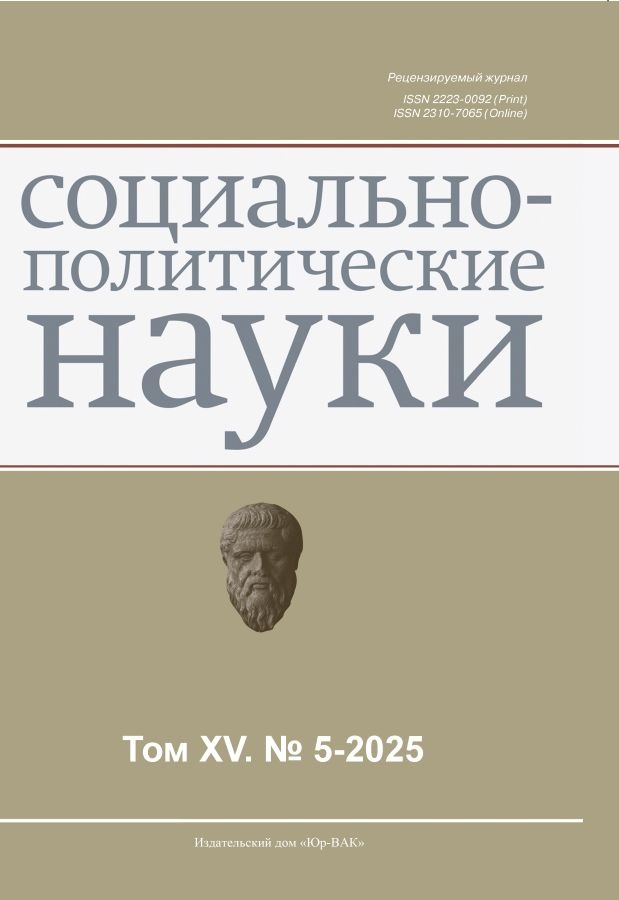Transformation of Legal Socialization in the Era of Internet Communication and its Impact on Legal Consciousness: A Socio-philosophical Analysis
- Autores: Garaeva G.F.1
-
Afiliações:
- Financial University under the Government of the Russian Federation
- Edição: Volume 15, Nº 5 (2025)
- Páginas: 190-198
- Seção: Political Sociology
- URL: https://journals.eco-vector.com/2223-0092/article/view/696808
- DOI: https://doi.org/10.33693/2223-0092-2025-15-5-190-198
- EDN: https://elibrary.ru/DPBCAR
- ID: 696808
Citar
Texto integral
Resumo
This article analyzes the transformation of legal socialization in the context of digitalization through the lens of a socio-philosophical approach. Online communication is becoming a key factor influencing the emergence of new forms and methods of legal socialization. It provides access to a vast array of legal information, a diversity of views on the essence of law and legal phenomena, and a variety of legal interpretations. At the same time, the internet also provides the preconditions for the emergence of negative phenomena, such as legal nihilism and pessimism. The article notes the importance of understanding the inevitability of the coexistence of primary, traditional legal socialization and secondary legal socialization based on online communication. Moreover, the impact of online communication can both strengthen and weaken the results of primary socialization. The article examines interactive, discussion-based communication among both lawyers and laypersons as an important characteristic of online legal socialization. This article demonstrates the inextricable link between legal socialization and legal awareness, and examines the risks and conditions under which legal awareness can deteriorate. The article focuses on the institutional aspects of legal socialization in the online space and the role of government agencies and public organizations in creating the conditions for developing a mature legal awareness.
Texto integral
Sobre autores
Galina Garaeva
Financial University under the Government of the Russian Federation
Autor responsável pela correspondência
Email: gfgaraeva@fa.ru
Código SPIN: 4127-7164
Dr. Sci. (Philos.), Professor, Professor, Department of Humanities
Rússia, MoscowBibliografia
- Gulyaikhin V.N. Legal socialization of man. Moscow: Yustitsin-form, 2014. 282 p.
- Ilyin I.A. Theory of law and state. V.A. Tomsinov (ed. and with a preface). Moscow, 2017. 552 p.
- Malakhov V.P., Aznagulova G.M. The problem of understanding the law in the context of digital reality. Bulletin of the Moscow City Pedagogical University. Series: Legal Sciences. 2021. No. 2 (42). Pз. 37–44. (In Rus.)
- Karnaushenko L.V. Deformation of legal consciousness in the context of the Internet. bulletin of the krasnodar university of the ministry of internal affairs. 2024. No. 3 (65). Pз. 85–89. (In Rus.)
- Kulakov A.A. Concept, essence, and digital reality of everyday legal consciousness. Siberian Legal Review. 2022. Vol. 19. No. 4. Pp. 332–342. (In Rus.)
- Ogorodnikov A.Yu. Relevance of legal consciousness in the modern pluralistic world. Bulletin of the O.E. Kutafin University. 2016. No. 4. Pp. 48–53. (In Rus.)
- Romashov R.A. Internet legal environment of hermeneutics. Leningrad Law Journal. 2016. No. 4 (46). Pp. 84–96. (In Rus.)
- Chikvin A.B. Concept of digital transformation in law. Bulletin of the Ural Law Institute of the Ministry of Internal Affairs of Russia. 2025. No. 2. Pp. 82–88. (In Rus.)
- Ewick P., Silbey S. The common place of law: Stories from everyday life. Chicago: Chicago University Press, 1998. 336 p.
- Sandrini P. Kommunikation im Spannungsfeld zwischen Recht und Sprachen. Innsbruck, 2008. 211 р.
Arquivos suplementares









